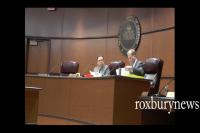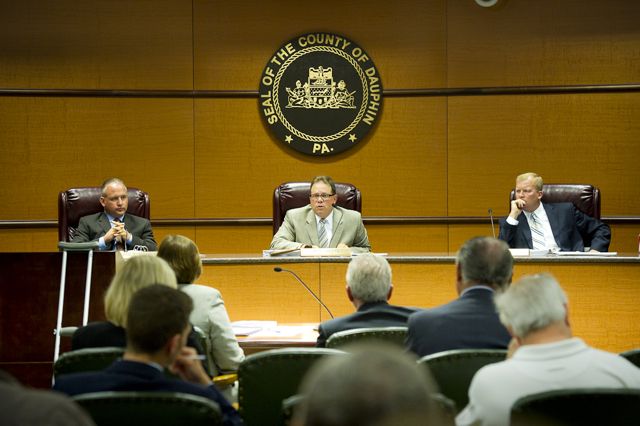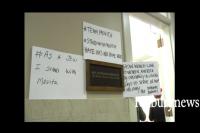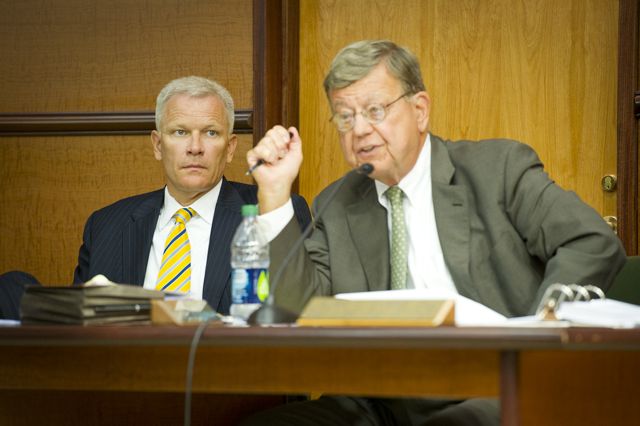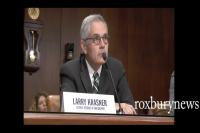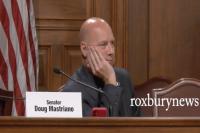As released by the Office of the Philadelphia District Attorney.
Two Pennsylvania Lawmakers Charged with Bribery by tashaj4
December 16, 2014: Today, District Attorney Seth Williams charged State Representatives Ronald Waters and Vanessa Lowery Brown with Criminal Conspiracy, Bribery in Official and Political Matters, Conflict of Interest, and Failure to Make Required Disclosures in Statement of Financial Interests for accepting money in exchange for promised political actions. The arrests of 64 year old Ron Waters and 48 year old Vanessa L. Brown are the result of a grand jury investigation into political corruption involving various Pennsylvania state legislators, public officials and other related individuals. The matter was submitted to a Philadelphia investigating grand jury after it was requested from the Pennsylvania Office of Attorney General (“OAG”) in April of 2014. This grand jury investigation is still on-going.
The OAG had conducted its political corruption investigation from 2010 through 2012, which resulted in 113 recorded meetings or conversations. Twenty six (26) of those recordings featured Rep. Ron Waters, who accepted nine (9) cash payments from the CI totaling $8,750. Twenty four (24) of those recordings featured State Rep. Vanessa Lowery Brown, who accepted five (5) cash payments totaling $4,000. That evidence was presented to the grand jury, which found that the cash payments were made because of the representatives’ official positions and their promises to perform official acts on behalf of the CI. Moreover, both representatives testified before the Grand Jury and admitted to their criminal conduct.
Rep. Waters, who has been a member of the Pennsylvania House of Representatives since 1999 and is currently the Secretary for the House Democratic Caucus, accepted payments from the CI beginning on October 22, 2010. In total, Rep. Waters took $8,750 from the CI, and took or promised to take the following official actions on behalf of the CI: voting “no” on House Bill 934; setting up – and attending – a meeting with an executive at the Philadelphia Parking Authority regarding a collections contract there; and contacting an elected official to help the CI’s friend obtain a job. Rep. Waters testified before the grand jury and admitted to this conduct, and acknowledged that he knew what he was doing was wrong, each time that he did it.
Rep. Brown, who has been a member of the Pennsylvania House of Representatives since 2009, accepted five payments from the CI beginning on February 11, 2011. In total, Rep. Brown took $4,000 from the CI, and took or promised to take the following official actions on behalf of the CI: voting “no” on House Bill 934; supporting privatization of the State Liquor Stores; promising to vote against “Lifeline,” a program offering discounts on phone service for low-income subscribers; setting up – and attending – a meeting with Thomasine Tynes, former President Judge of the Philadelphia Traffic Court, regarding a collections contract there; and setting up a social event with other “like-minded” legislators to help the CI broaden his legislative contacts. She also asked the CI what he gets out of the deal, and was willing to vote as directed by the CI. Rep. Brown testified before the grand jury and admitted to this conduct, and acknowledged that she knew what he was doing was wrong, each time that she did it. She also admitted that she knew there were strings attached to the money she was being given.
In addition to the overwhelming evidence of guilt, including the full admissions of Representatives Brown and Waters, the grand jury examined public criticisms about the investigation. In particular, the grand jury investigated claims that the original investigation was “racist,” that the CI was not credible because of the alleged magnitude of his own criminal case, that the subjects of the investigation were “entrapped,” and that a “comprehensive” review by subsequent state officials found no basis for bringing charges. The grand jury found each of those criticism empty.
Regarding the criticism that the investigation employed racial targeting, the grand jury found that such a claim was simply false. The grand jury heard testimony from numerous individuals, both black and white, both former and current state employees, who were involved in the original investigation. The grand jurors found their testimony to be credible. The grand jury also reviewed extensive documents obtained by subpoena. These internal documents demonstrated that there had never been any factual basis to the claim that the investigation was racially targeted. Finally, a high-ranking officer from the administration of the current attorney general testified under oath that “[t]here is absolutely nothing in the case file that would lead one to believe that” the investigation targeted only African-American legislators or ignored wrongdoing by white legislators. The official also testified that he “never for one second believed” that investigators were directed to conduct such an investigation.
With respect to the CI, the grand jury investigated whether his own charges and their resolution crippled this prosecution. After subpoenaing the files in the CI’s case and hearing testimony from current OAG employees who prosecuted that case, the evidence revealed that the total loss amounted to less than $100,000 – sufficient to provide leverage needed to gain his cooperation, but hardly so extreme as to justify dropping a major political corruption probe at precisely the point where the evidence was complete and compelling. Moreover, the CI was hardly the lynchpin of the case; his actions were thoroughly corroborated by the audio- and video-recordings, and he has been doubly corroborated by the testimony of Representatives Brown and Waters. The grand jury, therefore, found nothing concerning the CI that would undermine charging those caught on the tapes.
The grand jury also examined whether any of the legislators were “entrapped.” To that end, the jurors reviewed investigation documents that were created before any recordings had been made, and heard from investigators about how they proceeded. Most tellingly, Representatives Brown and Waters – and Judge Tynes – testified regarding their introductions to the CI and how he was passed from one public official to another. Finally, the grand jury reviewed a document prepared by the current administration of the OAG, which confirmed these findings. In an email between two high-ranking officials there, one stated that the case had “ample predication,” and that “no legislator was entrapped.” The other high-ranking official agreed. And so did the grand jury, finding no sign of entrapment that would undermine its recommended charges.
Finally, the grand jury looked at a “comprehensive” review of the case conducted by the current administration of the OAG, which supposedly exposed fatal weaknesses that made the case impossible to prosecute. That process was difficult because, despite numerous public references to this allegedly comprehensive review, it had never been shared with the public. And despite numerous requests and subpoenas, the grand jury did not receive the document itself until October 31, 2014, many months after the grand jury began its work, and only after a court order. Indeed, on repeated occasions, the grand jury was assured that it had received all relevant materials, only to receive significant additional materials upon judicial intervention. Each new document dump, of course, indicated that the prior representations had been false.
Nevertheless, the grand jury actually found that it was the review, rather than the underlying investigation, that appeared flawed. The review failed to examine a wealth of internal documents – documents created by and in the possession of the OAG – that contradicted the report’s assumptions. The review also failed to include interviews of agents to the investigation or others whose knowledge would have refuted the report’s preferred conclusions.
In short, the grand jury found nothing in the well-publicized “comprehensive” review that undermined its confidence in the recommended charges. The evidence outlined in the presentment is unusually damning, consisting as it does not only of eyewitness accounts, but of hours of tape recordings, and of detailed admissions by the subjects of the investigation themselves. Indeed, the fact that the subjects of the investigation agreed to testify freely before the grand jury is a testament to the strength of the evidence that had been compiled long before this matter was submitted to this grand jury. That evidence must see the light of day, and criminal charges are just and fair.
Representatives Brown and Waters turned themselves in to authorities this morning and are currently being processed by the Pennsylvania State Police.
______________________________
Archive published March 17,2014.
The Pennsylvania Legislative Black Caucus held a Black History Celebration in the media center of the capitol building Tuesday afternoon March 17th.
The event was hosted by PLBC Chairwomen Rep. Vanessa Lowery Brown of the 190 legislative district.
Video from Tuesday's event, Rep. Vanessa Brown.
Don't believe what you see out there, this is the truth, what you see right here today.
Rep. Ronald Waters.
Philly's well represented here.
Also appearing on stage were Rep. Brownlee and Rep. J P Miranda.
Rep. Miranda was charged with political corruptions in late January.
_________________________
From our archives.
Attorney General Kathleen Kane press event Monday March 16, 2014.
Attorney General Kane.
Attorney General Kane.
I don't take kindly to baseless allegations. Politics is a dirty business.
What do you think should happen to the five people who took gifts.
I think public corruption really is discussing, it turns my stomach,.
Was this just a rouge example of a case gone badly.
This case was done very poorly.
Allegedly targeting black legislators.
We have two independent sources, who reported it to two independent law enforcement agencies .
Did the Enquirer capture the full scope of the investigation.
I'm not here to bash a newspaper, I'm here to bash the anonymous sources.
A reach out to the feds and DA Marsico.
This case was almost dead 18 months before I took office.
A claim of race.
Focus on the Black Caucus. I've not raised a claim of race.
Why not start from scratch.
You can't pretend it didn't happen, you can't do a do over, you can't call a mulligan.
What were the barriers in trying this case.
The credibility of the confidential informant (CI) was completely shot.
Do you believe a crime occurred on the audio tapes.
I believe that we have evidence that certain legislators were taking money, and that's a crime.
_________________________________
Archive publisher Thursday April 10, 2014.
Pa AG Kathleen Kane held a 5pm press event to discuss the unsealing of court documents related to the Philadelphia sting operation.
Q - Who directed the racial targeting.
Adrian King.
One thing you don't have which you will need is the transcript of the March 20th hearing .
Dropping 2088 charges against the CI (Tyron Ali).
Who decided it was valid, your office or the judge.
Adrian King on being approached by a recently retired high ranking FBI official on March 8, 2013.
"I needed to be on the lookout for this case, that it was a mess".
The problem here is that this case has grown larger by the month, literary your reputation is on the line. Why would fellow government prosecutors not come forward and say she's right.
video:7393:Two things, federal authorities hardly ever comment. Quite honestly it doesn't matter what the DA from Philadelphia says.:
Can you talk about your use of the word predication.
A formal position by the US Attorney's office in Philadelphia.
The semantics of formal or informal.
Q - Are you going forward with any litigation against anybody involved leaking or reporting the story.
Leaks are a substantial violation of the law.
Q - Was Ali an undercover agent for another law enforcement agency.
You need to read the transcript.
Q - A conflict related to Daniel D. McCaffery.
I have to decide my own conflict.
Kathleen Kane.
I have thick skin, I can take the criticism.
Q - Did Ali play the attorney generals office.
Look seriously at the cooperation agreement.
Photo/Natalie Cake file.


